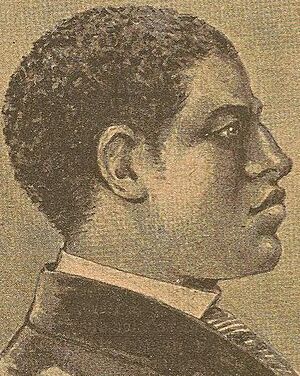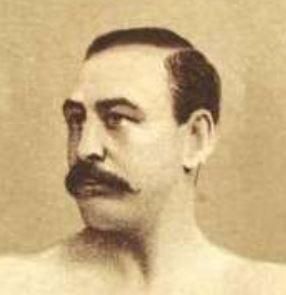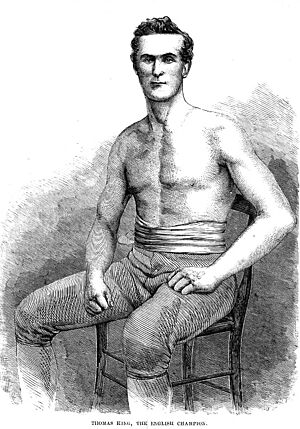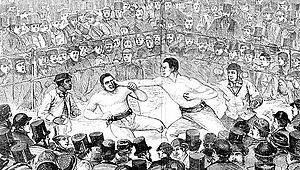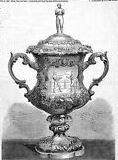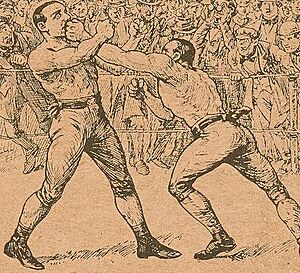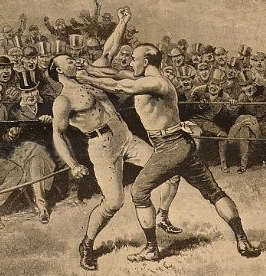Jem Mace facts for kids
Quick facts for kids James Mace |
|
|---|---|
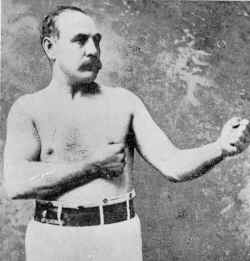 |
|
| Statistics | |
| Real name | James Mace |
| Nickname(s) | The Gypsy |
| Rated at | Won Welter - Heavyweight titles Boxing range 61.6 Kg -79.3 Kg (136-175 lbs.) |
| Height | 176 cm (5 ft 9.3 in) |
| Nationality | British |
| Born | 8 April 1831 Beeston, Norfolk, England |
| Died | 30 November 1910 (aged 79) Jarrow, County Durham, England |
| Boxing record | |
| Total fights | 37* (3 No Decisions) |
| Wins | 25* |
| Wins by KO | N/A |
| Losses | 5 |
| Draws | 5 |
James "Jem" Mace (born April 8, 1831 – died November 30, 1910) was a famous English boxing champion. He was known for fighting without gloves, which was called bare-knuckle boxing. Jem Mace was born in a small village called Beeston in Norfolk, England. Even though people called him "The Gypsy," he said in his life story that he was not from the Romani community.
Between 1860 and 1866, when he was at the peak of his career in England, he won many titles. These included the English Welterweight, Heavyweight, and Middleweight Championships. People thought he was one of the smartest boxers of his time because of his "scientific" way of fighting. He also held the World Heavyweight Championship from 1870 to 1871 while fighting in the United States.
Contents
Jem Mace's Boxing Career
Jem Mace was the fifth of eight children. His father, William, was a blacksmith. Jem was born on April 8, 1831, in the quiet village of Beeston, Norfolk.
In the early 1850s, Jem Mace started showing off his boxing skills. He worked at Nat Langham's Rum Pum-pas boxing club in London. There, he even boxed against Archibald William Douglas, who was the father of John Douglas. John Douglas later helped create the modern Marquess of Queensberry Rules for boxing. Jem Mace learned a lot by fighting many skilled amateur boxers at Nat Langham's boxing booth. He often performed at county fairs, earning extra money by giving boxing shows and training sessions. He even played his violin for the audience when he wasn't boxing!
One of his first big fights was when he was 24. He beat Bob Slack on October 2, 1855, in Mildenhall. The fight lasted only nine rounds and fourteen minutes. On February 17, 1857, Mace defeated Bill Thorpe near Canvey Island. Mace was in control of the fight. In the eighteenth round, he hit Thorpe's nose, and Thorpe could not continue. The fight ended after twenty-three minutes. People noticed how fast Jem Mace was and how strong and precise his punches were.
On September 21, 1858, Mace fought Bob Brettle for the English Welterweight Championship. Mace lost this fight quickly in just two rounds. But in a second try, Mace won the Welterweight title from Brettle in five rounds.
On January 25, 1859, Mace fought the undefeated Posh Price. In the eleventh and final round, Mace hit Price's left arm, which likely broke it. Price's team stopped the fight after only 17 minutes. Jem Mace showed his smart, "scientific" boxing style in this tough match. Even though he was young, his punches were hard and accurate, and he was very fast.
Mace fought Bob Travers on February 21, 1860. This fight was for £50 for each boxer. They started fighting near the Thames, but the police stopped them. They moved to another spot southeast of London. By the later rounds, Mace showed better defense and landed more punches. Mace won the fight after 57 rounds when Travers seemed to fall on purpose to avoid a punch. The fight lasted one hour and thirty-one minutes.
English Heavyweight Champion, 1861
On June 18, 1861, Jem Mace won the title of Heavyweight Champion of England. He beat the champion, Sam Hurst, in 8 rounds. The fight took place at Medway Island, Kent. Mace had been trained well by Nat Langham. Hurst was much heavier and taller, but he had broken his leg the year before, which might have made him slower. Mace took a big lead in the fight. In the eighth round, Hurst could barely defend himself. Hurst tried to charge forward, but Mace landed another blow. Hurst's team then stopped the fight after 50 minutes. Mace showed great skill in both defending himself and attacking.
Heavyweight Title Defenses
After winning the title, Mace had his first defense against Tom King on January 28, 1862. It was a cold and rainy day, and about 400 people watched. This fight was bare-knuckle under London Prize Ring Rules and lasted for 43 rounds, or 68 minutes. King was heavier and taller than Mace. For the first 30 rounds, King fought well. But in the second half, Mace took control. Even though King's punches had almost blinded Mace in both eyes early on, Mace finished the fight with a strong blow to King's throat in the last round.
Mace and King had a rematch less than a year later, on November 26, 1862. King was younger, taller, and heavier than Mace. Many reporters thought Mace was winning until the 20th round. Mace landed a punch to King's face. As Mace was about to land another punch, his foot slipped. King then hit Mace hard under his eye, knocking him down. In the 21st round, King hit Mace again, knocking him down to the grass. Mace's team then stopped the fight after 28 minutes. King became the new heavyweight champion.
On February 24, 1863, Jem Mace received the Windham Gold Cup. This was a special boxing trophy given to him for winning the heavyweight championship of England. The trophy was made of 100 ounces of gold and was worth a lot of money.
English Middleweight Champion
Jem Mace also became the English Middleweight champion on September 1, 1863. He won a 19-round fight against Joe Goss. The fight was moved several times because of police. It finally ended in Purfleet, Essex, near London. The prize money was a huge £1000. In the last round, Mace knocked Goss out with a strong punch to his jaw. People said that Goss was not as skilled, tall, or heavy as Mace.
Regaining Heavyweight Championship
Mace won back the English heavyweight championship from Joe Goss on August 6, 1866. This fight lasted 21 rounds. Goss was almost the same height and weight as Mace. But Mace's experience and skill were more important. Mace was very flexible and fast, easily avoiding Goss's attacks. He could punch quickly, especially with his left hand, and often hit Goss under his defenses. In the later rounds, Mace hit Goss's left eye many times. At the end of the fight, Mace was still strong, but Goss was tired and weak. Goss's team stopped the fight when he could no longer stand properly.
Bare-knuckle boxing was against the law in England. In 1867, Mace was arrested before a planned fight. This made him decide to go to America to continue his boxing career. In 1869, he moved to the United States, where prizefighting was still popular. He traveled with the famous American boxer John C. Heenan, giving boxing shows with gloves.
World Heavyweight Champion, 1870
Jem Mace's biggest win was on May 10, 1870. He defeated the English-born American boxer Tom Allen in Kennerville, Louisiana. The winner received $2500. This fight was for what is now known as the heavyweight world championship. Allen was ten years younger than Mace, who was 39. Allen injured his shoulder in the last round. Mace's face looked almost untouched, while Allen had injuries to his eyes and mouth from Mace's fast punches.
On April 6, 1871, Mace lost a fight in New Orleans to Gentleman Jose Alonso.
He defended his heavyweight title in one of his last important fights against Joe Coburn on November 30, 1871. It was a draw after ten rounds in Bay St. Louis, Mississippi. Both boxers were similar in weight and height. In this fight, Mace was thrown down many times. Coburn hurt his right wrist in the fifth round. In the eighth round, Coburn held Mace's head and punched him several times. Both boxers had injured hands, and it was raining heavily, making the ground muddy. So, they agreed to call it a draw in the 12th round.
After someone tried to hurt him in Mississippi, he went back to England. On December 16, 1876, he was back in America. This time, he fought with gloves under Queensberry Rules. He beat Bill Davis in Virginia City, Nevada. Mace won clearly, landing more punches.
When he was 58 years old, on February 7, 1890, he fought a much younger boxer named Charlie Mitchell in Glasgow, Scotland. This was for the English heavyweight title, but Mace lost in four rounds.
Exhibitions and Later Life
As Jem Mace became a champion, he also performed in traveling circuses. For a short time, he even owned his own circus. He toured with Pablo Fanque's Circus Royal in 1861. Pablo Fanque was England's first black circus owner.
In 1870, he gave boxing shows with American champion Joe Coburn in New Jersey and New York.
From 1878 to 1879, Mace gave many boxing shows in Australia. He helped make gloved boxing popular around the world. He also helped train many Australian boxers, including Peter Jackson, Bob Fitzsimmons, and Young Griffo. In 1882, he found future world heavyweight champion Bob Fitzsimmons in New Zealand.
Jem Mace continued to perform boxing exhibitions in England until 1895. In 1896, he returned to New York City for a show. The world heavyweight champion, James J. Corbett, praised Mace, saying he helped make boxing a better sport. Mace continued to do exhibition fights, with his last recorded show in 1909 when he was 78 years old. In 1898, he opened a boxing school in Cape Town, South Africa.
Other Interests and Passing
Jem Mace was a very good violinist. He wanted to be a musician when he was young and kept playing music throughout his boxing career. Some people believe that when three thugs broke his violin, his anger led him to become a boxer. He even played his violin at a club in London in 1856. In 1862, Mace started his own circus and traveled around England.
In 1870, Mace had a small part in a play called "As You Like It" in New York City. He played a wrestler and spoke a few lines. The audience, especially those who knew him as a famous boxer, enjoyed his realistic performance.
Businesses Jem Mace Owned
In 1866, Mace owned a park called Strawberry Gardens near Liverpool. This park had sports like running, bowling, wrestling, and boxing. Mace himself often showed off his boxing skills there. He also owned bars and racehorses at different times. He had a saloon in New York City called the Capitol Saloon. Later, he ran a hotel in Australia.
Jem Mace married three times and had at least fourteen children. He earned a lot of money during his life, but he also lost it. In his last years, he lived on a small pension and help from friends. He passed away in Jarrow, County Durham, England, from natural causes. He was buried in an unmarked grave in Anfield Cemetery, Liverpool. In 2002, a beautiful black marble headstone was placed on his grave by the Merseyside Former Boxers' Association.
Honours
Jem Mace has a special plaque in the center of Norwich to remember him.
In 1990, Jem Mace was added to the International Boxing Hall of Fame. He was the 34th person to be given this honor.
In 2014, he was also added to the Australian National Boxing Hall of Fame in the International category.
See also
 In Spanish: Jem Mace para niños
In Spanish: Jem Mace para niños
- List of bare-knuckle boxers
 | James Van Der Zee |
 | Alma Thomas |
 | Ellis Wilson |
 | Margaret Taylor-Burroughs |


